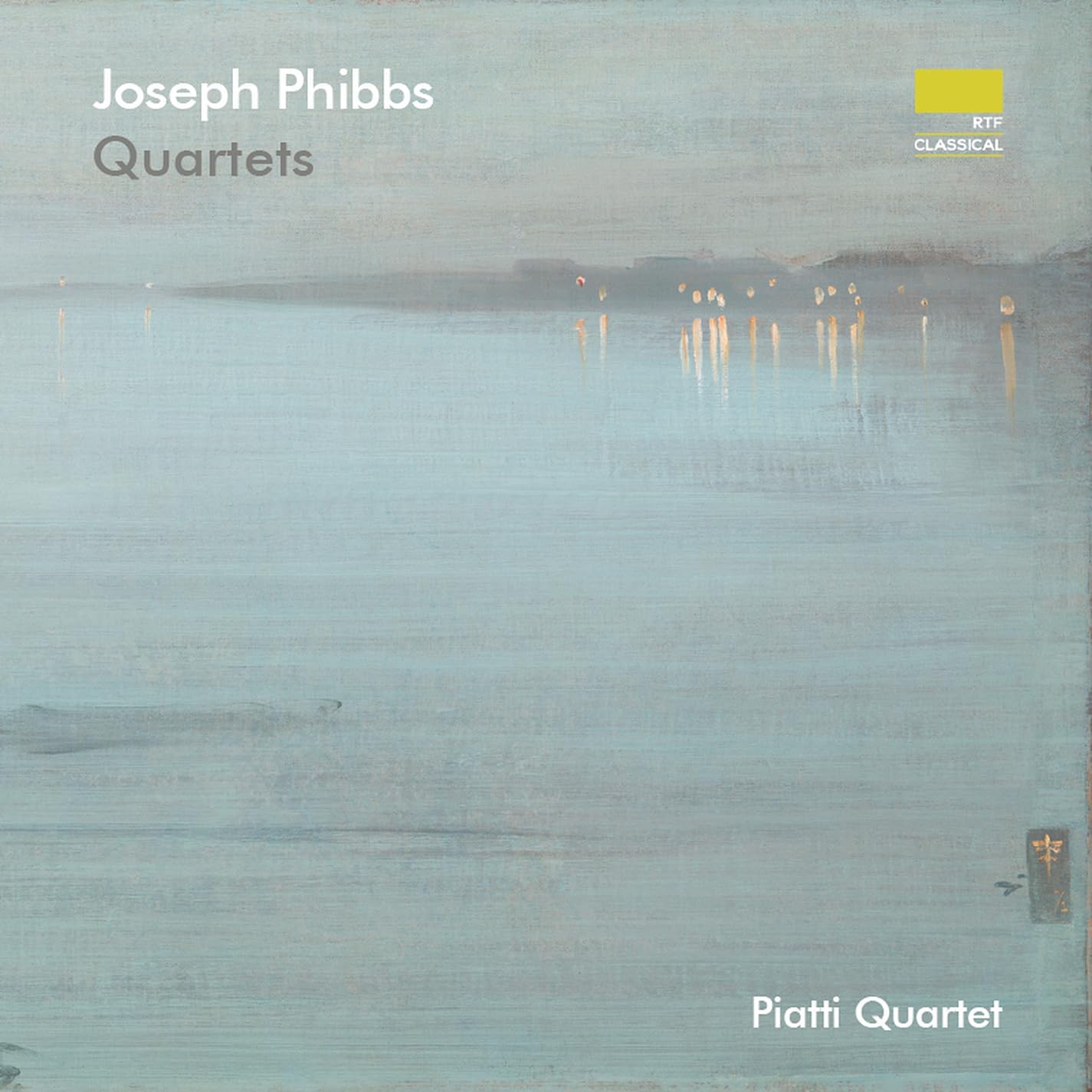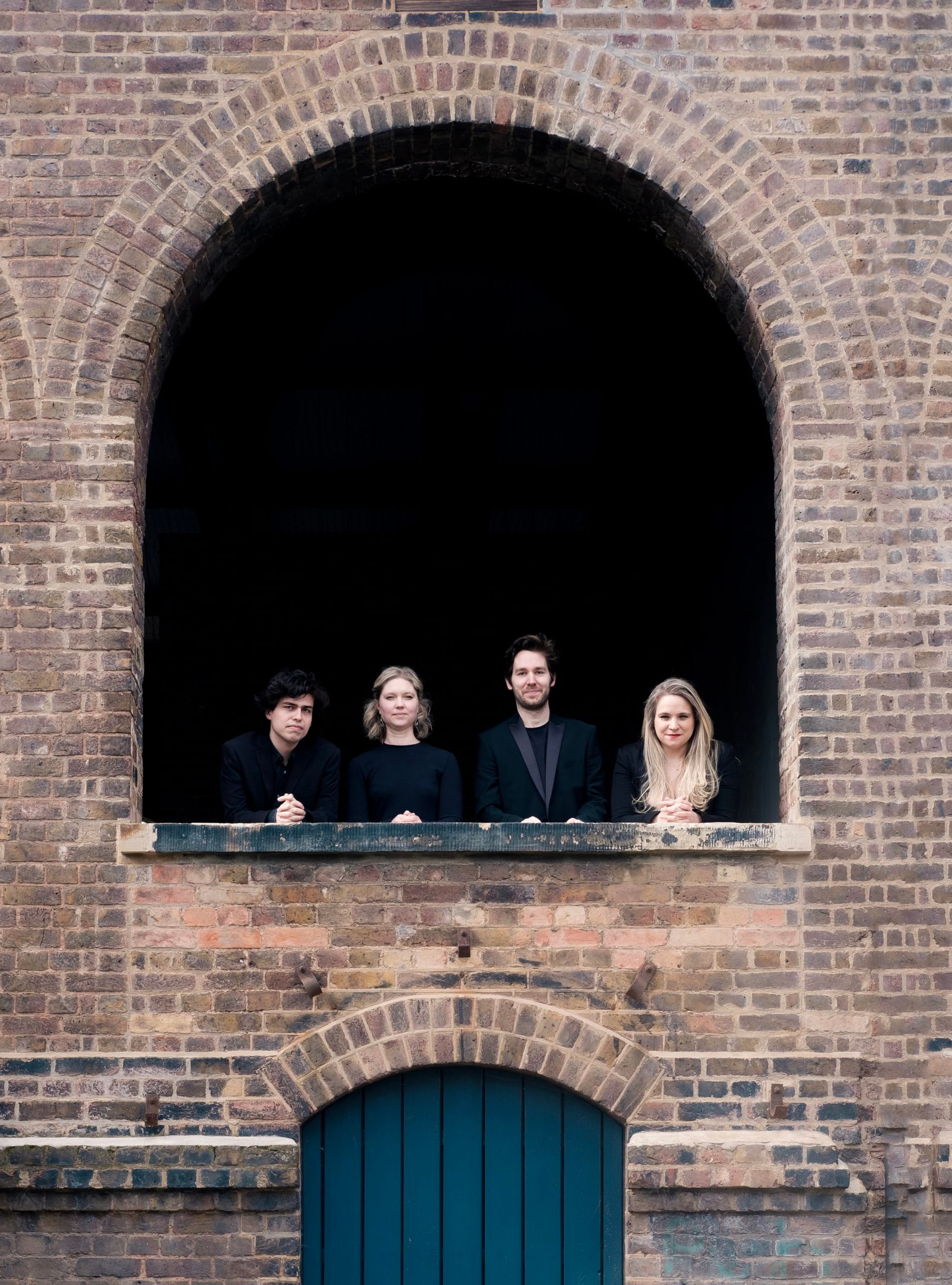
Entitled simply “Quartets,” this disc presents three of Joseph Phibbs‘ quartets, performed by the Piatti Quartet.The First (2014) is available on a Champs Hilll release, also by the Piatti Quartet, Albion Refracted, where it shares the programme wit music by Bridge, Britten and Turnage.
Phibbs is himself a cellist, and his introduction to the music of Britten, at the impressionable age of 14, was via that composer’s First String Quartet. Both First and Fourth Quartets of Phibbs’ were written for the Piatti Quartet; No. 2 was written for the Navarro Quartet, and No. 3 for the Belcea Quartet. Phibbs has an individual voice: compelling, expressive.
Here, as way of introduction, is indeed Britten’s First Quartet, played bytes Alberni Quartet:
This recording celebrates ten yeas of the PIatti Quartet working with Joseph Phibbs.

There is a terrific intensity to the Quartet No. 2 (2015). Cast in four movements, it begins with a Presto that is as elusive as any Bartók Nightmusic (indeed, the composer describes it as a “sort of nocturne”), initially grounded by a cello pedal and including a somewhat nightmarish waltz. There is a radiant beauty to some of the chordal passages here, too, beautifully sustained by the Piatti Quartet:
The second movement is a variant on a fugue (in the way the material moves between the four quartet members). It is fast and unsettled, and simply superbly performed here, the melodies sometimes almost folkish:
The short, interludial “Chitarra” pretty much does what it says on the tin, imitates a guitar, but with a Phibbsian accent before tensions escalate and the music becomes eve more frenetic, something viscerally conveyed by the Piatti Quartet’s collective virtuosity.
The finale is a Lento affetuoso, and attests to Phibbs’ melodic strengths: the aching principal melody, which is passed between the instruments, is modern, individual, and memorable.
The Third Quartet was written in 2018 and revised in 2021, and was he second work composed for the Belcea Quartet (the first was Canticle of the Rose in 2005). The piece is dedicated to Steven Stucky (1949-2016). The first movement is subtitled, “Illuminations” and is both an invocation of city lights and a glance at Britten. Underpinning the faster sections, often quiet, is a febrile energy:
The Presto (agitato) has its more contrasting moments, and pays homage to Beethoven’s Third “Razumovsky” Quartet (Op. 59/3). But the heart of the quartet is the “Notturno e fantasia, ” a blissful exploration of internal space superbly sustained by the Piatti Quartet:
It is fascinating that Phibbs follows this with a “Corrente” (a term associated with the Baroque period) couched in slightly bluesy terms. The “Corrente” (running) element is presumably the always moving pizzicato. there is a Trio, which back-references the world of the first movement, but it is the melodic profiles against that pizzicato that remain in the memory:
The finale feels like a summation. The opening lament was written for the Belcea Quartet’s violist Krzysztof Chorzelski, and is superbly delivered here by the Piatti Quartet’s Miguel Sabrinho:
The Fourth Quartet’s ink is still wet: it dates from 2024. A joint commission by the Richard Thomas Foundation and the Piatti Quartet, this differs from the other sin that it is a sequence of character pieces, beginning with a vibrant, colourful “Film Sequence”. Presumably this is Phibbs’ equivalent to Schoenberg’s Begleitungsmusik zu einer Lightspielszene, Op. 34 (Accompaniment to a cinematographic scene):
But it is in the slow movements that Phibbs really excels, and such is the case here with the “Notturno,” stasis in music moving with positively Mahlerian tread. I wonder if the occasional portamento is notated? Either way, it works:
And when we hit the Cantilena, we hear the world of he slow movements of the late Beethoven Quartets refracted though a 21st-Century prism. What is fascinating is that Phibbs follows it with whirling “Burlesque” (“earthy” as the composer himself describes it) before a Passacaglia finale that foregrounds the cello, in direct tribute to the Piatti Quartet’s cellist Jessie Ann Richardson. This is a fascinating culminating movement (although I assume, and hope, this will not be the last of Phibbs’ quartets, not by a long chalk). Here’s that haunting finale:
Listening carefully to these performances, registering time and again, on realises not only just how powerful the music is, but also the superb name of the performances. All four instrumentalists: Michael Trainor, Emily Holland, violins, Miguel Sabrinho, viola, Jessie Ann Richardson, cello – is expert in their own right, but they combine to make a whole greater than the sum of their four pars – surely the vey definition of heat string quartet playing.
Phibbs’ First Quartet is no warm-up: the quiet intensity is remarkable. In the performance above, the PIatti Quartet (ow on Champs Hill) offers a finely emotive performance. Here’s the first movement:
Dance suffuses the second movement (“Canto I – Conforza – Duo I”) as well as slow, kaleidoscopically-shifting textures. Eventually, teh music seems to almost dissipate into the Heavens:
There are some remarkable sonorities in this quartet; plus that sense of Phibbsian disquiet, something that pervades the fourth movement (“Canto II”):
The quartet ends with a “Vocalise” supported by barely audible sustained chords. A superb pice, brilliantly performed.
Elsewhere, I enjoyed also the World Premiere of Phibbs’ Horn Sonata at Hatfield House (review), Joseph Phibbs ha an individual voice
The disc of Quartets 2-4 is available at Amazon here; the Albion Refracted disc is here.











